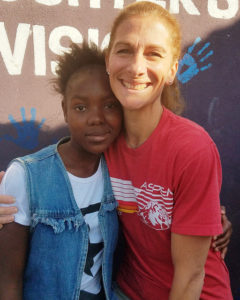 Monday, July 23 – It’s always difficult to summarize an entire 2.5 week trip with so many moving parts and pieces that somehow always seem to come together to make the trip work… project partners, programming, itineraries, and, most importantly, our student travelers. This year’s trip was no exception and our students embraced all aspects of the trip, taking everything in stride.
Monday, July 23 – It’s always difficult to summarize an entire 2.5 week trip with so many moving parts and pieces that somehow always seem to come together to make the trip work… project partners, programming, itineraries, and, most importantly, our student travelers. This year’s trip was no exception and our students embraced all aspects of the trip, taking everything in stride.
Our focus on health and sex education, HIV prevention, and gender equity felt especially poignant at a time when the importance of educating and empowering girls is gaining more attention worldwide. We worked with students from one of the top government schools in Lusaka to those attending school in makeshift classrooms with limited schools supplies and no textbooks.
We led classes that helped to educate gap year students at Chikumbuso Women’s and Orphans Project on basic anatomy, contraception, disease prevention, and healthy relationships. We engaged in meaningful conversations about what a healthy relationship looks like and came face to face with the reality of how economic disparities and the varying earning potentials of men and women impact their values, perspectives, and expectations when it comes to relationships. We learned that while something as basic as desiring and earning respect from your partner is still steeped in cultural norms, certain barriers, attitudes, and behaviors are slowly being challenged. We learned that many common myths have already been challenged and addressed within the younger generation but that there is still some work to be done. We learned that many of the issues teens and youth struggle with in the compounds of Lusaka when it comes to peer pressure around sex, relationships, and even substance use, are similar to some of the issues our teens face right here in Washington, DC.
We engaged in an exchange of curricular ideas with peer educators at both Grassroots Soccer and Africa Directions, two NGOs that are working with youth across Zambia to encourage more positive attitudes and behavior with regard to their own health and sexual lives. We bore witness to the amazing work of a woman who started a non-profit called Daughter’s Vision with the mission of providing an education to girls in the community who are unable to attend school due to poverty or the lack of familial support. These girls touched us all with their desire to learn amidst the obstacles that lay before them.
We also spent time with Greenpop’s “Director of Trees” to learn more about environmental sustainability, specifically the impact deforestation is having not only within Zambia but globally. Unlike countries such as Rwanda where a tree must be planted for every one that is cut down, Zambia is cutting down its forests at a rate of 350,000 trees per year. Ultimately, this is having a detrimental effect on its wildlife, weather, and natural resources. As our students learned about the root causes of deforestation in addition to its effect on the environment, they were able to play a small restorative role by planting some trees of their own.
One of our most impressive project partners was a woman we were connected to through Greenpop who has started the Loveness Hangoma Foundation to help people in Livingstone living with disabilities and special needs, a portion of the population that is not only overlooked but often ostracized and isolated from the public. Loveness, the founder, inspired our students by relaying to them the different ways in which she tries to support her people. What impressed us most was her determination to not only provide food, clothing, shelter, and an education despite very limited means but to provide them with a sense of family and teach them to use their own voices when fighting for their rights and a place in society. Hearing from two of her star pupils in person left many in our group moved by the depth of Loveness’ dedication to her “children” as well as the resilience of a group of people who have learned to fight for themselves when others do not.
Most importantly, our students learned the importance of taking into account cultural differences and perspectives as well as access to resources when working with people from different communities. Through daily debriefs and reflections, a great sense of compassion and understanding of these differences grew over the course of the trip, as well as a greater sense of appreciation for things often taken for granted in the US. Our hope is that they take these lessons with them as they return to the US and their lives in DC and continue to find ways to promote greater compassion within their own communities with a newfound global perspective.
As Treazure, one of our travelers, journaled to herself at the beginning of the trip, “I hope you have taken advantage of the opportunity you have been awarded and realize that to give back opens the door for various opportunities and allows you to appreciate everything you receive. Remember, be mindful, not have your mind full.”
Words to live by.
Gaby Grebski, LearnServe Zambia Trip Leader
